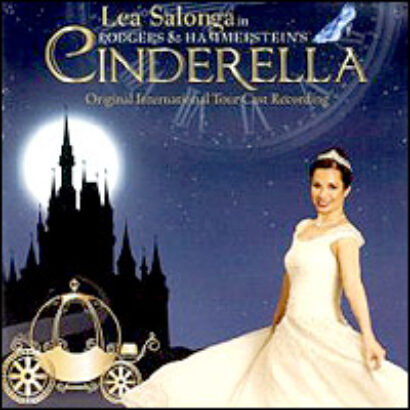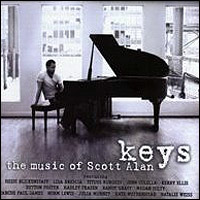
CINDERELLA [Broadway Asia]
Rodgers & Hammerstein's TV musical "Cinderella" has been crammed into theatrical slippers time and time again since the boys devised it as a 77-minute television spectacular. "Cinderella" aired on March 31, 1957 — the 14th birthday of Oklahoma!, as it happened — and people seemingly started musing over its stageworthiness the next morning. Hammerstein himself announced back in 1958 that he was converting the thing for Broadway, although that was fated never to happen; he recognized the inherent problems and reconsidered, or he became too ill and ceased work (take your pick).
Those built-in problems have to do firstly with the slight nature of Hammerstein's devised-for-television libretto, which rejects padding; and secondly with the unavailability of Rodgers and Hammerstein (the latter of whom died in 1960) to write suitable new songs. This hasn't stopped anybody, needless to say; the strength of the basic score — with five especially good songs — and the family-entertainment suitability of the plot have convinced numerous hands to do "Cinderella" as a musical. Beginning with Tommy Steele and Harold Fielding, in 1958, with Mr. Steele starring as Buttons. (Buttons?) And this while Mr. Hammerstein was still around.
A firm called Broadway Asia — which is more or less the Frankel-Routh-Viertel-Baruch group of producers from The Producers, Hairspray, Gypsy and more — has been touring a Cinderella on the other side of the world, with Lea Salonga in the lead. This new Cinderella has now issued a cast album, with favorable results. It starts out on an unfortunate note, as someone has seen fit to have that 17th-century scullery lass come out and sing "The Sweetest Sounds," which is not at all what a 17th-century scullery lass would come out and sing. Musically or lyrically; it sticks out like a sore thumb, or a sore pinky-toe, and gets the affair off on the proverbial wrong foot.
Things get quickly back on track, fortunately, with "The Prince Is Having a Ball." The other additions to the score, from the Rodgers-Hammerstein oeuvre, are somewhat more suitable. "Loneliness of Evening," a cut song from South Pacific, has been used in so many Cinderellas that it seems part of the score by now. "Boys and Girls Like You and Me," a cut song from Oklahoma! is merely passable; would a 17th-century king and queen refer to themselves as just another boy and girl? Also interpolated is "There's Music in You," a moderately pleasing song written for Mary Martin back in 1953 which doesn't have much to do with "Cinderella" as envisioned by Hammerstein.
R & H had no compunction about taking unused songs from South Pacific and plunking them into The King and I and Pipe Dream, so one supposes that if Oscar thought "Loneliness of Evening," "Boys and Girls Like You and Me," or "There's Music in You" suitable for "Cinderella," he'd have happily recycled them then and there. These are mixed in with the rest well enough; the rest being such charmers as "In My Own Little Corner," "Your Majesties," "Impossible," the "Waltz for a Ball," "Ten Minutes Ago," "Do I Love You Because You're Beautiful?" and that ever-so-nifty "Stepsisters' Lament." As the years go by, I am more and more impressed by the R&H work on "Cinderella"; the core score is really and truly pretty fine. But as written by Hammerstein, it wasn't devised as nor intended to be a full-scale stage musical. Without Oscar around to do the cobbling, it never seems to make the transition. Boosting the enjoyment level of this recording is the cast and the musical playing. Aside from Ms. Salonga, who makes a creditable and spirited girl of the cinders, there isn't a soul here that I've ever heard of. The fact that I've never heard of any of them doesn't reflect on the quality of the personnel, of course; I suppose that they cast from a pool of performers who were available for an extended Asian tour at the salaries offered. In any event, just about everyone on the recording contributes. Charlie Parker is the Fairy Godmother, Peter Saide the Prince, Jefferson Slinkard the King, and Jen Bechter and Brandy Zarle play those wickedest-of-all stepsisters. Include in the commendations the various soloists from the ensemble, who provide numerous flavorful touches. The orchestra of 27 players sounds good, too, with Russell Bennett's original orchestrations supplemented with new ones by Larry Blank. (These last two I have, indeed, heard of.) Gerard Salonga and J. Michael Duff are both listed as musical director, with the former conducting the recording.
 |
Scott Alan released a CD of his songs last year called "Still Dreaming Wide Awake," which was well received by listeners and by this column. He has followed up with more of the same, under the title "Keys." Alan's attractive songs are filled with interesting ideas and often soaring emotions; in song after song, the composer/lyricist develops self-contained personal dramas. These are songs of love, or in most cases lost love; while no overall theme is expressed in the accompanying booklet, every character seems to be lamenting an affair that has ended. Can't Mr. Alan write a happy, cheerful song once in a while? There is, actually, a charmingly peppy number included, "His Name," although it is about — literally — love lost; the gal can't remember the boy's name, and she lost his phone number. The rest of the songs are of a more adult nature, and each of the 13 selections tends to engross the listener. But nobody seems too happy.
As on his debut album, Mr. Alan is well represented by his friends. While the art includes photos of Mr. Alan at the keyboard, he neither plays nor sings on this album. No need to, with the likes of Randy Graff, Julia Murney, Tituss Burgess, Jenn Colella, Lisa Brescia, Heidi Blickenstaff, Norm Lewis, Kate Wetherhead, Megan Hilty and Sutton Foster on hand to do it for him. All of whom help to make "Keys" a worthy successor to "Still Dreaming Wide Awake," and one which serves to further enhance the notion that Mr. Alan is someone to keep our eyes, and ears, on.
(Steven Suskin is author of the forthcoming "The Sound of Broadway Music: A Book of Orchestrators and Orchestrations" (Oxford) as well as "Second Act Trouble," "Show Tunes," and the "Opening Night on Broadway" books. He can be reached at [email protected])










